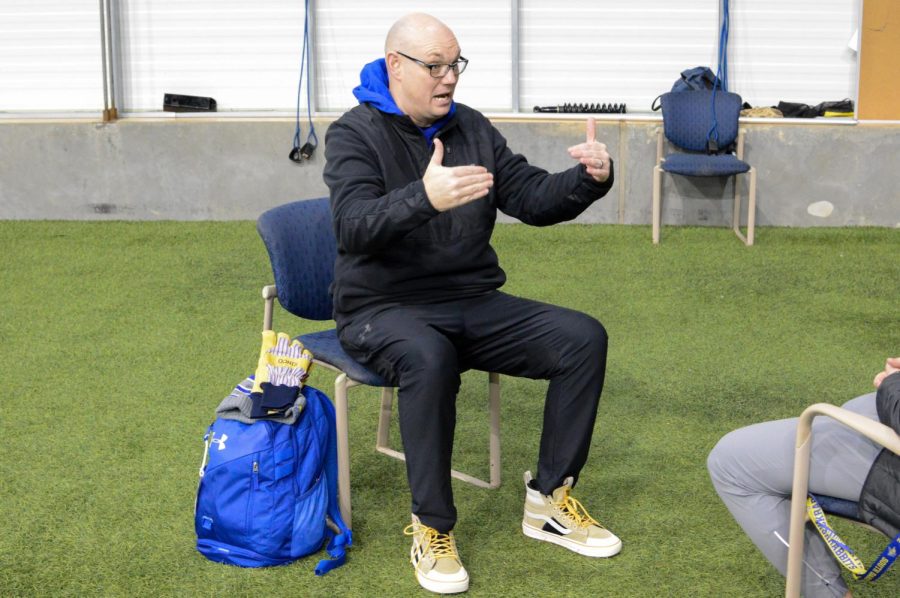Mental health coach brings new meaning to sports
January 26, 2022
Kris Kracht thinks it’s all well and good that athletes run, lift weights and practice their particular sport to get better, but he also thinks the most important “muscle” to an athlete’s success is their mind.
The 44-year-old Kracht started as the Jackrabbits’ mental performance coach in October 2020. Since then, he has been working to help athletes reach their full potential.
Softball coach Krista Wood, who led the Jacks to their first-ever Summit League title last spring with a 43-8 record, is glad Kracht is here to help.
“Kris has helped us elevate the program to the championship level,” Wood said.
Kracht works with 10 different teams at SDSU in individual or team sessions. He says his goal is to “weaponize the student athlete’s brain.”
“We can build the mental strength so when they get into a situation where they need the mental strength, they have the tools to overcome (a challenge) on their own,” he said.
Kracht achieves that by teaching exercises such as self-talk, finding one’s intensity/energy number, developing a mental routine and other methods.
He said he looks at every athlete as a four-legged table:
- The first leg is spending time training in the gym working on technique;
- The second leg is the time in the weight room working on physical strength;
- The third leg is the strategizing and planning of plays – the more tactical side;
- And the fourth leg is the mental side to the athlete. That leg is extremely important but also the most forgotten, Kracht said.
“You can have the best of the first three legs, but if you don’t work on the fourth leg, you are losing so much great potential,” Kracht said.
Kracht wasn’t always a mental performance coach. He graduated from the University of Mary with a degree in communication, which led him to get his master’s degree in communication at SDSU. He moved to Minnesota and coached collegiate speech and debate at Saint Peter’s College in Minnesota. Some of the members on his team had speaker anxiety and he wanted to help them overcome that problem.
When researching ways to help, he came across mental performance coaching and started using what he learned to help the team members. He found that it was highly effective – so much so that it got to the point where he had people willing to pay for his help.
Kracht felt it wasn’t right to get money from people for something he didn’t necessarily feel he was qualified to provide. So, after some time and consideration, he decided to return to school to get a degree in sports psychology at SDSU.
Once Kracht graduated in fall 2020, he felt equipped to help others using what he has learned. Garrett Greenfield, an offensive tackle for the SDSU football team, has been working with Kracht since Kracht arrived. Greenfield participates in team and individual sessions.
Greenfield says that as the season progresses, practices seem to get longer and an athlete’s energy can wane. With Kracht’s help, Greenfield noticed the increase and consistency in his energy level throughout the season. The 6-foot-6, 295-pound advertising major said he thinks that when your mind is good, it can help you achieve things you never imagined.
“(Kracht) asks questions about life and tries to get to know me,” Greenfield said. “We talk about personal stuff and then we move on to the football talk. Talking to him has improved me as a player.”
Football coach John Stiegelmeier thinks mental health is essential. None of the coaching staff members have the tools that Kracht has, so the coach is happy he has Kracht to help.
“If you have a team that understands and can control their mental state against someone who cannot, you have an advantage over them and their team,” Stiegelmeier said.
Stiegelmeier often sends members of his team to individual sessions with Kracht. The individual sessions feature a tailor-made approach to their specific situation and position. The coach says he has seen a clear improvement in his players’ mental state because of these sessions. Athletes gain an understanding of how to control their highs and lows better, leading them to a better performance.
Wood, the softball coach, has been using Kracht from the beginning and doesn’t plan on changing that approach anytime soon. Softball is a highly mental sport, she says, and Kracht has helped the team work to become more mentally tough.
“You are going to fail,” Wood said. “What matters most is how you respond to it. Kracht is helping us learn how to respond to those situations more effectively.”
For his part, Kracht sees himself as an advocate for mental health.
“I hope that we can normalize mental health training so that it becomes a normal part of life,” he said. “I want it to be valued just as much as anything else.”
























